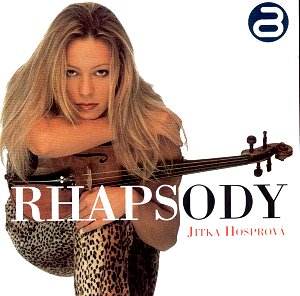There is a great deal of young musical
talent in the Czech Republic and in
Slovakia (violinist Veronika Jarůšková
is Slovakian) and Arco Diva is doing
its bit to promote it. The unusually
glamorous cover picture is augmented
by Jitka Hosprová’s own thoughts
on musical life as well as autobiographical
details and reflections on the music
compiled by note writer Petr Veber –
the second paragraph indeed deals with
the issue of Hosprová’s provocative
presence. That she has also constructed
a balanced and challenging programme
is perhaps more to the point. Three
of the six pieces are for solo viola
and elsewhere she is joined by Jarůšková
in the Martinů and by the harpist
Kateřina Englichová for the arrangements
of Britten and Monti.
Slavicky
is still underrepresented outside his native land but his fairly
recent death may present an opportunity for assessment. The Rhapsody
is a short, three-movement work of some eleven minutes. Its opening
is stark, quite abrasive and resinous but the central movement
opens out in restrained lyricism, the solo viola flying in
alt and occasionally undercut by the rude imposition of tough
contrastive interjections. The movement’s title, Dialogo drammatico
gives one an indication of its binary disjunction. In this way
the internalised dialogue sees alternate lyrical and violent material
ending with the viola’s resumption of playing in alt, having
presumably won over the fractious disquiet of its other, divided
self. Much simpler is the finale, full of virtuosic dash and something
of an ear cleanser. Zdeněk Lukáš is, with Sylvie Bodorová,
one of the members of the Quattro group of composers whom Arco
Diva has done so much recently to promote. His four movement solo
sonata is more companionable listening than Slavicky’s work. The
Interludio is musing, elegiac with some folk influence emerging
over its span whilst the bustly Moto perpetuo opens out for a
brief but dazzling tune – some scary intonational difficulties
here though late on in the movement. Bodorová’s Gila Rome
– Meditations for Solo Viola is barely six minutes long and means
Sing, Gypsy. She has made a study of Gypsy music and her
own complex national and geographical origins doubtless have some
significant bearing as well. Opening in a distant, inward mood
with distinctive gypsy melody the second movement is a fast and
dramatic embodiment of her marking Impetuoso and lasts
a whisker over a minute. The finale has about it a kind of keening
and an absolutely distinctive husky "speaking" quality
that hints at some unspoken narrative significance beyond its
immediate self. It’s appropriate in a bizarre sense I suppose
that this complex appreciation and absorption of gypsy or Roma
music should be followed by Monti’s generic Csárdás.
What Bodorová constructs in so veiled a way Monti has made
cod explicit but never mind, it makes for a link and provides
an opportunity for a virtuosic encore.
I
have yet to mention the Martinů and Britten. In the Madrigals
she and Veronika Jarůšková make a good pairing, both tonally
and expressively. They are receptive and perceptive interpreters
and I liked the performance. Comparison with Jiři Novák and
Milan Škampa (Supraphon 1985) in this repertoire is, I suppose,
inevitable and readers will want to know how the younger pairing
bear up. As I said, well, but it’s incontestable that they are
just that fraction less incisive rhythmically and they vest the
music with less musical dynamics and colour. Heard in isolation
no one would be disappointed but if we are judging by the highest
standards – and Novák and Škampa are the peaks in this
kind of literature – the greater variety of tone production and
character and atmosphere of the veterans wins out every time.
The Britten is a harp-accompanied arrangement and Hosprová’s dexterity
is not in doubt. I listened for comparative purposes to a favourite
recording of mine made by her illustrious compatriot Josef Koďousek
and pianist Květa Novotná back in ’79. Hosprová is brisker
than Koďousek, more clear-eyed, virtuosic. In Kateřina
Englichová she has a resourceful partner and together theirs is
a valuable performance. What I miss is Koďousek’s eloquent
and expressive preparation for – and unfolding of – the finally
stated Dowland song and his half glints, colours, and sense of
rubato. Hers is a robust, youthful performance full of affirmation,
his more introspective and tinged with melancholy.
Jonathan
Woolf
The
Arcodiva catalogue is now offered by MusicWeb

![]() for
details
for
details